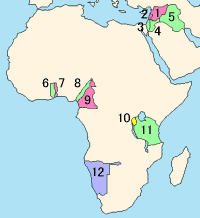
A League of Nations mandate represented a legal status under international law for specific territories following World War I, involving the transfer of control from one nation to another. These mandates served as legal documents establishing the internationally agreed terms for administering the territory on behalf of the League of Nations. Combining elements of both a treaty and a constitution, these mandates contained minority rights clauses that provided for the rights of petition and adjudication by the Permanent Court of International Justice.

Palau, officially the Republic of Palau, is an island country in the Micronesia subregion of Oceania in the western Pacific Ocean. The republic consists of approximately 340 islands and is the western part of the Caroline Islands, while the eastern and central parts make up the Federated States of Micronesia.
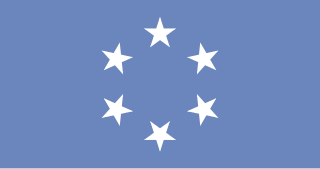
The Trust Territory of the Pacific Islands (TTPI) was a United Nations trust territory in Micronesia administered by the United States from 1947 to 1994. The Imperial Japanese South Seas Mandate had been seized by the US during the Pacific War, as Japan had administered the territory since the League of Nations gave Japan a mandate over the area from Imperial Germany after World War I. However, in the 1930s, Japan left the League of Nations and invaded additional lands. During World War II, military control of the islands was disputed, but by the war's end, the islands had come under the Allies' control. The Trust Territory of the Pacific was created to administer the islands as part of the United States while still under the auspices of the United Nations. Most of the island groups in the territory became independent states, with some degree of ties kept with the United States: the Federated States of Micronesia, Marshall Islands and Palau are today independent states in a Compact of Free Association with the US, while the Northern Mariana Islands remain under US jurisdiction, as an unincorporated territory and commonwealth.

The United Nations Trusteeship Council is one of the six principal organs of the United Nations, established to help ensure that trust territories were administered in the best interests of their inhabitants and of international peace and security.

The United Nations trust territories were the successors of the remaining League of Nations mandates, and came into being when the League of Nations ceased to exist in 1946. All the trust territories were administered through the United Nations Trusteeship Council and authorized to a single country. The concept is distinct from a territory temporarily and directly governed by the United Nations.

The United Nations System consists of the United Nations' six principal bodies, the specialized agencies and related organizations. The UN System includes subsidiary bodies such as the separately administered funds and programmes, research and training institutes, and other subsidiary entities. Some of these organizations predate the founding of the United Nations in 1945 and were inherited after the dissolution of the League of Nations.

British Togoland, officially the Mandate Territory of Togoland and later officially the Trust Territory of Togoland, was a territory in West Africa under the administration of the United Kingdom, which subsequently entered a union with Ghana, part of which became its Volta Region. The territory was effectively formed in 1916 by the splitting of the German protectorate of Togoland into two territories, French Togoland and British Togoland, during the First World War. Initially, it was a League of Nations Class B mandate. In 1922, British Togoland was formally placed under British rule, and French Togoland, now Togo, was placed under French rule.
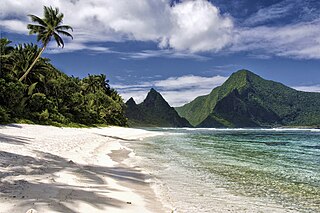
In the law of the United States, an insular area is a U.S.-associated jurisdiction that is not part of a U.S. state or the District of Columbia. This includes fourteen U.S. territories administered under U.S. sovereignty, as well as three sovereign states each with a Compact of Free Association with the United States. The term also may be used to refer to the previous status of the Swan Islands, Hawaii, Guam, Puerto Rico, and the Philippines, as well as the Trust Territory of the Pacific Islands when it existed.

The Compacts of Free Association (COFA) are international agreements establishing and governing the relationships of free association between the United States and the three Pacific Island sovereign states of the Federated States of Micronesia (FSM), the Republic of the Marshall Islands (RMI), and the Republic of Palau. As a result, these countries are sometimes known as the Freely Associated States (FASs). All three agreements next expire in 2043.
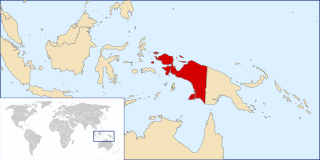
The New York Agreement is an agreement signed by the Kingdom of the Netherlands and Indonesia regarding the administration of the territory of Western New Guinea. The first part of the agreement proposes that the United Nations assume administration of the territory, and a second part proposes a set of social conditions that will be provided if the United Nations exercises a discretion proposed in article 12 of the agreement to allow Indonesian occupation and administration of the territory. Negotiated during meetings hosted by the United States, the agreement was signed on 15 August 1962 at the United Nations Headquarters in New York City, United States.
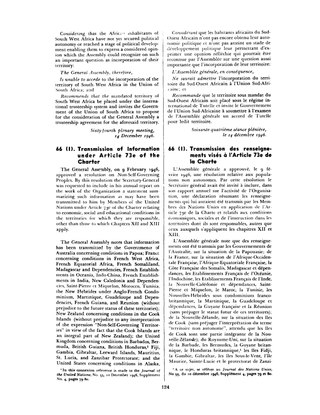
Chapter XI of the United Nations Charter defines a non-self-governing territory (NSGT) as a territory "whose people have not yet attained a full measure of self-government". Chapter XI of the UN Charter also includes a "Declaration on Non-Self-Governing Territories" that the interests of the occupants of dependent territories are paramount and requires member states of the United Nations in control of such territories to submit annual information reports concerning the development of those territories. Since 1946, the UNGA has maintained a list of non-self governing territories under member states' control. Since its inception, dozens of territories have been removed from the list, typically when they attained independence or internal self-government, while other territories have been added as new administering countries joined the United Nations or the UN General Assembly (UNGA) reassessed their status.
Stuart Jay Beck was an American law practitioner and a diplomat for Palau. As a lawyer he helped negotiate the Compact of Free Association, which established Palau as an independent nation in free association with the United States in 1994. For his contributions to Palau, he was granted honorary citizenship.

United Nations Security Council Resolution 21 was adopted unanimously on 2 April 1947. The Council placed the German Pacific Islands, which were formerly mandated to Japan by the League of Nations, under the Trusteeship System.

United Nations Administered West New Guinea refers to the period between 1 October 1962 and 1 May 1963 when Western New Guinea was administered by the United Nations Temporary Executive Authority (UNTEA) in accordance with in article two of the New York Agreement reached between the governments of the Netherlands and Indonesia in August 1962.
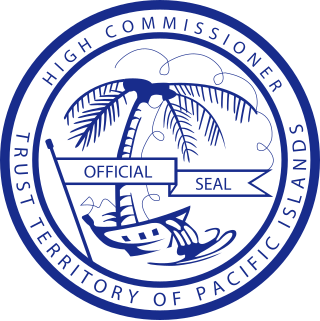
The high commissioner of the Trust Territory of the Pacific Islands was an official who administered the Trust Territory of the Pacific Islands (TTPI), a United Nations trusteeship in the Pacific Ocean under the administration of the United States, between 1947 and 1994. The territory consisted of islands captured by America during World War II, prior to which they had been part of the Empire of Japan as the South Seas Mandate, within the Japanese colonial empire. After World War II, United Nations Security Council Resolution 21 placed the territory under the United States trusteeship as the Trust Territory of the Pacific Islands. The islands are now part of Palau, Northern Mariana Islands, Federated States of Micronesia, and Marshall Islands.
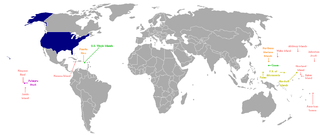
United Nations Security Council resolution 683, adopted on 22 December 1990, after recalling Resolution 21 (1947) which approved the Trusteeship Territory of the Japanese Mandated Islands as well as Chapter XII of the United Nations Charter which established the United Nations Trusteeship system, the council determined that, in the light of entry into force of new status agreements for the Federated States of Micronesia, the Marshall Islands and the Northern Mariana Islands, the objectives of the Trusteeship Agreement had been completed and therefore ended the Trusteeship Agreement with those entities.
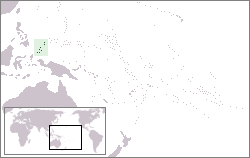
United Nations Security Council resolution 963, adopted unanimously on 29 November 1994, after examining the application of the Republic of Palau for membership in the United Nations, the Council recommended to the General Assembly that Palau be admitted.
The Marianas archipelago of the Northern Pacific contains fourteen islands located between Japan and New Guinea on a north–south axis and Hawaii and the Philippines on an east–west axis. Inhabitants were Spanish nationals from the 16th century until the Spanish–American War of 1898. As Guam became a territory of the United States the Northern Marianas were sold to Germany in 1899. The Northern Mariana Islands were a German protectorate until 1919, when they became part of the South Seas Mandate, administered by Japan. At the close of World War II, the Marianas became part of the Trust Territory of the Pacific Islands. In 1975, the Commonwealth of the Northern Mariana Islands became a self-governing territory. In 1986, the Marianas came under the sovereignty of the United States when the trusteeship ended and US nationality and citizenship was conferred on the inhabitants of the territory.
Palauan nationality law is regulated by the 1980 Constitution of Palau, as amended; the 1994 Palau Citizenship Act, and its revisions; and international agreements entered into by the Palauan government. These laws determine who is, or is eligible to be, a national of Palau. The legal means to acquire nationality, formal legal membership in a nation, differ from the domestic relationship of rights and obligations between a national and the nation, known as citizenship. Palauan nationality is typically obtained either on the principle of jus soli, i.e. by birth in Palau or under the rules of jus sanguinis, i.e. by birth abroad to parents with Palauan nationality. It can be granted to persons with an affiliation to the country through naturalization.
















